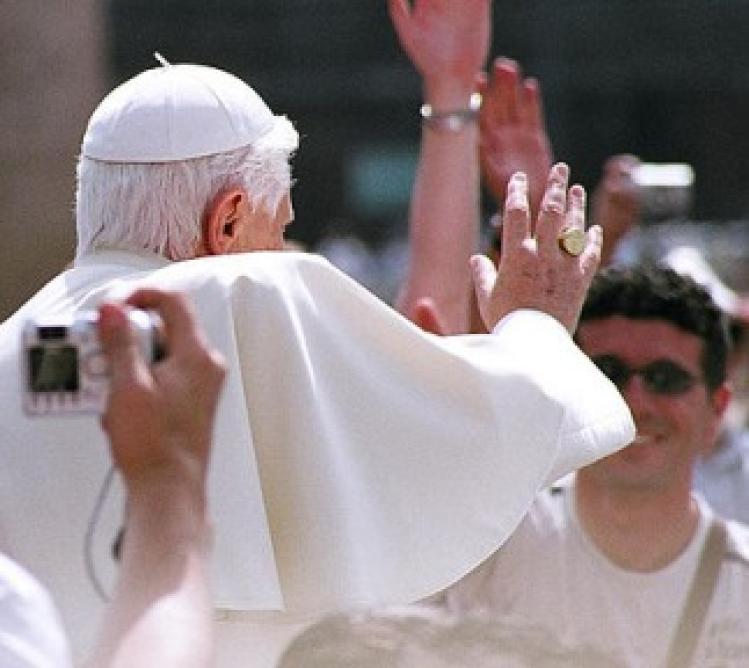
Several Orthodox friends have asked what I think of Pope Benedict XVI’s resignation. A few are, like me, former Roman Catholics. When I mentioned Joseph A. Komonchak’s comment in Commonweal (“Benedict’s Act of Humility”) that the pope’s resignation brought the papacy back into the church, they were very sympathetic. They were also sympathetic to Benedict himself, noting—as so many have—that his decision must have been brought on partly by his experience of watching John Paul II’s slow decline, and the disorder that swirled around it.
There are rumors of secret reports, gay Vatican cabals, blackmail related to sex-scandal cover-ups. Any or all of this may be part of the real story. But respect for Benedict—earned, I think, by the quality and compassionate nature of his thought and the not unimportant fact that he was the one who forced Marcial Maciel Degollado, the founder of the Legionaries of Christ, to step down after John Paul had refused to do so—makes me believe that Benedict’s reasons for resigning were for the good of the church. He may have been too much of a company man all his life, and he has this in common with almost all bishops. Courage and moral integrity haven’t been major parts of the bishop’s job description. But when Benedict could finally take action against Maciel, he did. And he tried to reach out to victims of some of the bad policies he had helped keep in place as head of the Congregation for the Doctrine of the Faith. This is not nothing. It is also hardly heroic.
But heroism isn’t the point. The humility of his decision to give up power is, and this really does matter. It will affect future papacies, all to the good. There is something of kenosis in giving up any power you could hold on to, and God bless Benedict for doing this. I hope it spells the beginning of a rethinking of the nature of papal power. Lord Acton went to Rome during the First Vatican Council to lobby against the idea of papal infallibility, and his oft-quoted line “Power tends to corrupt, and absolute power corrupts absolutely” was a reference to the papacy. I believe Benedict’s resignation was a genuinely selfless act, done for the good of all.
When I say “the good of all,” I mean to include those of us who are not Roman Catholics. It could seem that we aren’t involved in this, but I remember something an Orthodox monk said to me years ago: “We should pray for the strength of the Catholic Church. Without them we look pretty silly.” What he meant, I think, was that the Catholic Church, like the Eastern and Oriental Orthodox Churches and the Church of the East (they don’t like to be called Nestorians), goes back in an unbroken way to apostolic times, and shares a set of beliefs and assumptions about the world that are challenged in our time. As the largest of the ancient apostolic churches and the one with the most visible and vocal presence in the West, Roman Catholicism has a vital role in presenting a vision of the world that is sacramental. When it gets it right, the Catholic Church can show ancient tradition to be a living thing. Jaroslav Pelikan famously wrote, “Tradition is the living faith of the dead; traditionalism is the dead faith of the living.” The Catholic Worker movement and the Little Brothers of Jesus, to name only two examples, show the life, and life-giving nature, of Catholicism in striking ways. Within Orthodoxy, people like Mother Maria Skobtsova (who died in a Nazi concentration camp, where she was sent for aiding Jews) and the Lourmel community she founded in Paris and saints like Silouan of Mt. Athos offer a similar living vision.
While Benedict’s successor certainly should clean house and force the resignation of many bishops, and while I can think of many reforms that would perhaps be helpful (the restoration of the female diaconate and a larger place for women in the church, the ordination of married men, more genuine conciliarity and collegiality among bishops), the great problem is that even these unlikely reforms would probably change little. The Catholic Church and all churches face the fact that we live in a world that is not so much hostile to traditional religion as completely indifferent to it. The church fills a need the world doesn’t think it has. It answers questions no one is asking.
I have met some genuinely holy people, and they make all the difference. They lead people to question themselves and the direction of their lives. It is the manifestation of holiness that we need. Bishops, from the pope on down, have had little to do with this, and, by confusing holiness with morality (primarily the sexual kind), the hierarchy has muddied the waters.
We need the courage to try to pray without ceasing, as Paul counsels. We need saints.

